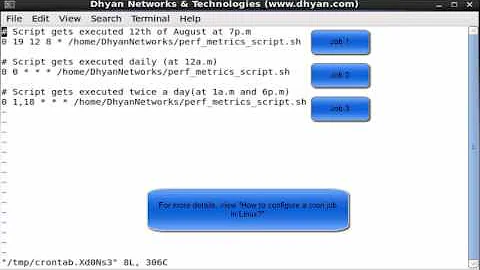How can I view results of my cron jobs?
Solution 1
Check if the programs you run with cron have their own log files. If if they don't but write their output to the standard outputs you can redirect these to files or mail them to you. Inside crontabs standard shell redirection works.
E.g. to redirect the error output of some_job.sh to some_job.err and discarding the standard output (i.e. sending it to /dev/null) add the following redirection to your crontab
33 3 * * * /path/to/some_job.sh 1> /dev/null 2> /other/path/to/some_job.err
or to mail it to you instead (if mail is available)
33 3 * * * /path/to/some_job.sh 1> /dev/null 2>&1 | mail -s "cron output" [email protected]
Solution 2
Most cron daemons on platforms I've worked with automatically email the stdout/stderr of user cron jobs to the user whose crontab the job came from. I forget what happens to system-wide (non-user-specific cron jobs from /etc/crontab). The thing is people don't always set up a mailer daemon (that is, a Mail Transfer Agent (MTA) like sendmail, qmail, or postfix) on most Unix-like OSes anymore. So the cron job output emails just die in a local mail spool folder somewhere if they even get that far. So one answer might just be to fire up your mailer daemon, and maybe make sure you have a ~/.forward file to forward your local mail along to your "real" email account.
If you want your jobs to write to specific log files, you can use standard output redirection like @honk suggested, or, supposing your cron job is a shell script, you could have your script call logger(1) or syslog(1) or whatever other command-line tool your OS provides for sending arbitrary messages to syslog. Then you could use your OS's built-in methods for configuring which kinds of messages get logged where, perhaps by editing /etc/syslog.conf.
Most of my cron jobs invoke bash scripts I wrote specifically for the purpose of being started by cron for a particular reason. In those, especially when I'm initially writing and debugging them, I like to use bash's "set -vx" to make the unexpanded and expanded form of each line of the shell script get written to stdout before it gets executed. Note that shell scripts started from cron are considered non-login, non-interactive shells, so your standard shell startup scripts like .bashrc and .profile aren't run. If you use bash and want bash to run a startup script, you have to define an environment variable "BASH_ENV=/path/to/my/startup/script" in your crontab before the line where you define the job.
Solution 3
I think redirecting within the cron-file might not be the best option in this case.
Often you want the logging speification co-located with the cron job script. In this case, I suggest the following:
#!/bin/bash
exec &>> capture-log.txt
echo "Running cron-job foo at $(date)"
...
<rest of script>
This appends the output from the cron job to the capture-log.txt file.
Solution 4
The tasks cron is executing are responsible for their own logging.
Solution 5
The simplest way is to capture error messages and save them in a file. I have a cron job that calls a php command line, like this:
1 0 * * * php /pathOfMyApp/index.php controllerName functionName > /pathOfMyApp/log/myErrorLog 2>&1
The part before > is my cron job and after > is the capture and save in a file located in a log folder in the root of my project, but could be any place you want. Note: every time the cron job runs it will overwrite the previous log file. You can use >> to append to the end of an existing file.
If your crontab uses curl or wget and refers to a link, you can search in /var/log/httpd/appName for access-log, if cron is returning with 500 or 400 must be something wrong.
As a last resort, you can check /var/log/messages too.
Related videos on Youtube
sarath
Updated on September 17, 2022Comments
-
 sarath over 1 year
sarath over 1 yearI see so many guides on how to run crontab, but what I need right now is to learn how to
- Find log files about cron jobs
- Configure what gets logged
-
 Ciro Santilli Путлер Капут 六四事 almost 7 years
Ciro Santilli Путлер Капут 六四事 almost 7 years
-
Darren Young about 14 yearsThis is how I've always solved my cron issues.
-
Timmmm over 11 yearsIs that second example right? Wouldn't it redirect everything to
/dev/null? -
Benjamin Bannier over 11 years@Timmmm: I does work. It first redirects everything from
some_job.sh's stdout to/dev/nulland only after its stderr to stdout (which now contains nothing itself anymore). That way only its stderr ends up in stdout and is passed on tomail. -
 flickerfly almost 10 yearsI find this to often be the easiest to turn on and off for debugging. I typically just use username@localhost for the email address.
flickerfly almost 10 yearsI find this to often be the easiest to turn on and off for debugging. I typically just use username@localhost for the email address. -
akostadinov about 9 yearsThis is correct. One can use
mailcommand to read messages from the command line. Or look at/var/spool/mail. But if you have installed postfix or other mailer than standard sendmail, another way to read messages is needed. -
Martin Konecny about 7 yearsWhy do we need a mail service agent just for this?
mail -s "cron output" [email protected]works just fine :/ -
sffc almost 7 yearsOn CentOS, my cron output gets "mailed" to /var/spool/mail. See it by running
less $MAILif you want to see cron output for the current user orless /var/spool/mail/rootif you want to see cron output for commands running as root. -
 Burak Kaymakci over 3 yearswhere to put that?
Burak Kaymakci over 3 yearswhere to put that? -
 nobody over 3 yearsPut is at the top of your crontab. When you enter crontab with
nobody over 3 yearsPut is at the top of your crontab. When you enter crontab withcrontab -e. PutMAILTO=<e-mail>line as the first line, and it will apply for all crontab entries. You can also specifyMAILTOfor each entry, just put differentMAILTO=<email>in front of each crontab entry/line. -
 tripleee about 2 yearsThe
tripleee about 2 yearsThe&>>redirection operator is not available inshscripts, or really old versions of Bash. The standard and portable way to express the same thing is>>capture-log.txt 2>&1i.e. redirect standard output to append to the file and redirect standard error to the same place. -
 tripleee about 2 yearsThis obviously requires mail to be properly configured on the system, which is often not the case, especially in ad-hoc Docker containers etc. If you don't have a MTA installed at all, maybe look for a
tripleee about 2 yearsThis obviously requires mail to be properly configured on the system, which is often not the case, especially in ad-hoc Docker containers etc. If you don't have a MTA installed at all, maybe look for adead.letterfile in your home directory; though moderncronimplementations will detect this, and simply discard the output if it can't be sent anywhere. -
 tripleee about 2 yearsYou are overwriting the output file on every invocation, which can be quite troublesome. Probably better to append with
tripleee about 2 yearsYou are overwriting the output file on every invocation, which can be quite troublesome. Probably better to append with>> -
 tripleee about 2 yearsThe paragraph about
tripleee about 2 yearsThe paragraph about/var/log/httpd/appNameseems confused. I would expect that to contain errors from the HTTP server though of course if you fetch a URL fromlocalhostthe server is obviously on the same machine as thecronjob. -
 nobody about 2 years@tripleee It is written in the answer that you have to have your e-mail configured. Thanks for the dead.letter and other info.
nobody about 2 years@tripleee It is written in the answer that you have to have your e-mail configured. Thanks for the dead.letter and other info.




